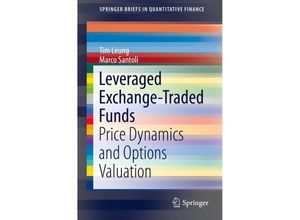This book provides an analysis under both discrete-time and continuous-time frameworks on the
price dynamics of leveraged exchange-traded funds (LETFs) with emphasis on the roles of
leverage ratio realized volatility investment horizon and tracking errors. This study
provides new insights on the risks associated with LETFs. It also leads to the discussion of
new risk management concepts such as admissible leverage ratios and admissible risk horizon
as well as the mathematical and empirical analyses of several trading strategies including
static portfolios pairs trading and stop-loss strategies involving ETFs and LETFs. The final
part of the book addresses the pricing of options written on LETFs. Since different LETFs are
designed to track the same reference index these funds and their associated options share very
similar sources of randomness. The authors provide a no-arbitrage pricing approach that
consistently value options on LETFs with different leverage ratios with stochastic volatility
and jumps in the reference index. Their results are useful for market making of these options
and for identifying price discrepancies across the LETF options markets. As the market of
leveraged exchange-traded products become a sizeable connected part of the financial market it
is crucial to better understand its feedback effect and broader market impact. This is
important not only for individual and institutional investors but also for regulators.

